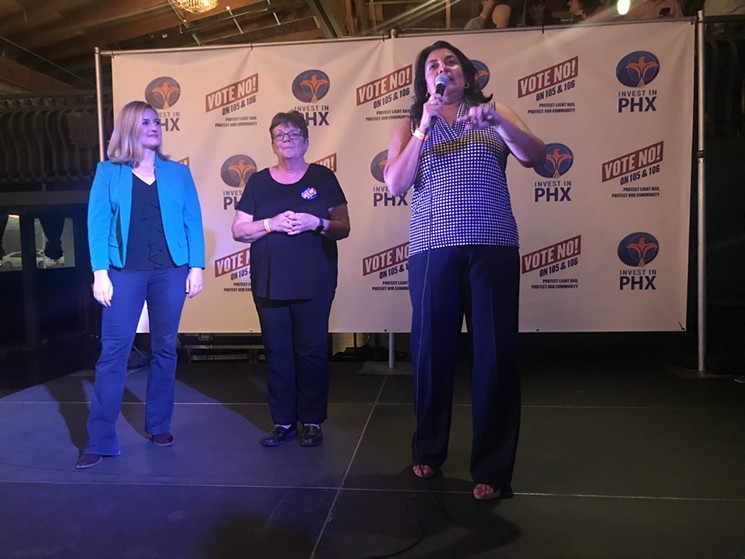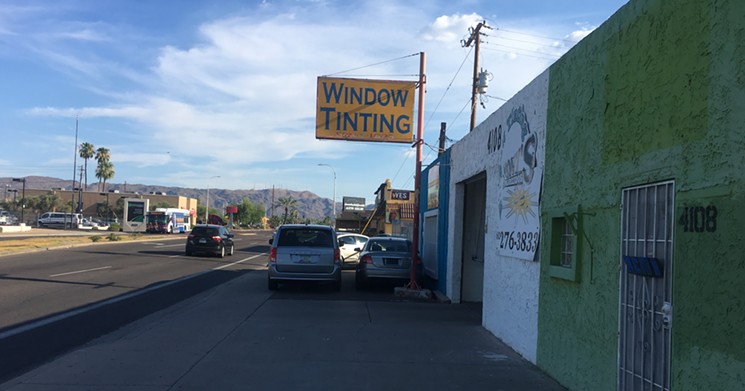Phoenix voters rejected an initiative Tuesday that would have banned new rail construction in the city, rebuking an unusual alliance between Koch-funded groups and small business owners intent on killing the future of public transportation in the Valley.
City residents also voted down a proposition that would have dramatically reduced new spending to pay down Phoenix's pension debt, an act of municipal austerity that would have affected services like libraries, parks, and homeless shelters.
Phoenix residents voted in relatively large droves for a proposition-only local election, with more than 195,000 turning in early ballots. By deadline, the turnout for this August 27 special election looked poised to eclipse the number of voters in March's runoff mayoral election.
Neither vote was close. With all but about 9,000 ballots counted as of 5 p.m. Wednesday, voters who opposed the anti-light rail Proposition 105 outnumbered those who voted yes by 116,190 to 69,662. Also, 119,563 voters opposed Proposition 106, the pension reform initiative, compared with 60,491 who voted for the measure.
Shortly after the blowout results were posted by the City Clerk, light rail supporters erupted in cheers at an election watch party held at The Van Buren. A group with matching t-shirts chanted, "Si se puede!"
Mayor Kate Gallego, along with City Council members Debra Stark and Laura Pastor, gave celebratory speeches to the crowd of more than 100.

Mayor Kate Gallego and city council members Debra Stark and Laura Pastor celebrate the results
Meg O'Connor
"The future of Phoenix starts today and that future includes light rail, it includes investing in our libraries and our parks, and it includes a Phoenix where Phoenicians decide who governs us," said Mayor Gallego to the crowd of mainly young professionals, organizers, and elected officials.
"We're the fifth largest city. Let's start acting like it, right? We need a transportation system. Not just roads, not just light rails, buses, everything. We gotta grow up and be the big city we are," said Stark, who also served as the chair of a committee that opposed both propositions.
The mood was less cheerful at Poncho’s Mexican Food and Cantina, where regular Tuesday evening diners sat alongside anti-light rail business owners and political operatives.
"I'm at a loss for words," said Larry Cohen, the owner of a jewelry store on South Central Avenue, expressing fear that a planned light rail extension right outside his shop could hurt or destroy his business. "I don't know what lies in the future."
Community activist Salvador Reza, who supported Proposition 105, interrupted the sighs of disappointment to give a rousing speech.
"The fight is not over," he said. "We have to keep fighting so the city will compensate all the businesses that will be destroyed by the extension of this route."
Reza added: "We have to put City Hall against the wall.
Opponents of both propositions criticized them as extreme measures pushed by outside libertarian influences. There is truth to that claim.
Proposition 105, the ballot initiative against light rail, grew out of a movement last year to end or alter the planned construction of a light rail line in south Phoenix.
At the time, local business owners said they felt blindsided by the city's decision to narrow traffic on South Central Avenue to two lanes. During summer 2018, however, opponents of the south Phoenix extension began targeting all future rail construction.

Tony's Window Tinting, one of the businesses involved in the early stages of opposing the south Phoenix light rail extension.
Steven Hsieh
Around the same time the light rail opponents eyed a ballot initiative, leaders of the movement started communicating regularly with the Arizona Free Enterprise Club, which receives significant funding from Charles Koch’s national political nonprofit. Proposition 105 fits in line with a national movement by the Koch network to undermine public transportation projects.
Scot Mussi, president of the Free Enterprise Club, helped the group draft its ballot language and hire a signature-gathering firm, and he arranged a meeting with city officials for best petition practices. He also donated $40,000 to the campaign, about 30 percent of his salary with the Free Enterprise Club.
Proponents of Proposition 105 claimed that the city of Phoenix underestimated the cost of light rail, noting that the proposed budget for expansions has doubled since 2015. Supporters of the initiative also stressed that only 1 percent of the city population rides light rail and that the redirected revenue would go toward fixing roads.
Opponents of Proposition 105 pointed out that Phoenix residents have voted to fund light rail on three separate occasions, most recently approving an increased sales tax in 2015 to pay for expansions in the Valley Metro transit system. Organized under a political committee called Invest in PHX, the pro-light rail side argued that increasing public transit is necessary to meet population growth and serve commuters who can't afford cars, and noted that Phoenix would likely lose billions of federal dollars if the initiative passed.
Invest in PHX benefited from nearly $1 million in contributions. Business groups, labor organizations, and nonprofits associated with Arizona State University all gave large donations to the pro-light rail campaign.
The election result is also a significant victory for Mayor Gallego, who won election in March on a platform that included seeing through the planned light rail expansions.
The same coalition of groups that opposed Proposition 105 also campaigned against Proposition 106, an initiative aimed at reducing Phoenix's pension debt. Pushed by City Council member Sal DiCiccio, the measure would have required the city to conduct annual assessments of its obligation to retirees. If the initiative had passed, Phoenix officials would have been prohibited from spending beyond increases tied to population growth if the pension debt was not 90 percent paid off. Funding for police and fire services would be exempted from the cuts.
DiCiccio helped put the pension initiative on the ballot with the help of outside political groups, including a pair of right-wing operatives based in Wyoming. A Utah city council woman served as the chairperson for the political committee supporting the effort, Responsible Budgets. As the Arizona Republic reported, supporters of Proposition 106 viewed the initiative as a test case in Phoenix that, if successful, could be replicated in other cities. They argued Phoenix can not responsibly maintain its pension debt of about $4.5 billion.
Opponents said Proposition 106 is an extreme response to Phoenix's pension debt, arguing that it's possible to pay down the obligation without cutting services like parks, libraries, and homeless shelters. They also criticized Responsible Budgets for its use of dark money, in which donors for a political campaign are kept secret. The vast majority of the $64,000 in contributions received by Responsible Budgets were funneled through a political nonprofit that is not required to disclose its donors.
Meg O'Connor contributed reporting.












